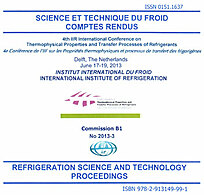
Document IIF
Une analyse thermodynamique des frigorigènes. 1. Les limites thermodynamiques du cycle de compression de vapeur.
A thermodynamic analysis of refrigerants. 1. Thermodynamic limits of the vapor compression cycle.
Numéro : pap. n. TP-020
Auteurs : DOMANSKI P. A., BROWN J. S., HEO J., et al.
Résumé
This paper explores the thermodynamic performance limits of the vapor compression cycle. We have applied evolutionary algorithms to explore the performance of hypothetical refrigerants defined by the thermodynamic parameters used by the extended corresponding states model for fluid properties. We identified optimal values of these parameters required to reach the performance limits. The study confirmed the fundamental trade-off between the coefficient of performance (COP) and volumetric capacity, and indicated refrigerant critical temperature as the dominant parameter influencing the tradeoff. Thermodynamic performance limits depend on the operating conditions and the cycle design. These limits are represented by Pareto fronts developed for the objective functions COP and volumetric capacity. As expected, the performance of current refrigerants falls below the Pareto front limits. We demonstrate that for practical cycles the developed methodology and resulting Pareto fronts are more realistic benchmarks for the performance potentials of refrigerants than is COP alone, which is an efficiency only metric.
Documents disponibles
Format PDF
Pages : 8 p.
Disponible
Prix public
20 €
Prix membre*
Gratuit
* meilleur tarif applicable selon le type d'adhésion (voir le détail des avantages des adhésions individuelles et collectives)
Détails
- Titre original : A thermodynamic analysis of refrigerants. 1. Thermodynamic limits of the vapor compression cycle.
- Identifiant de la fiche : 30008099
- Langues : Anglais
- Source : 4th IIR Conference on Thermophysical Properties and Transfer Processes of Refrigerants
- Date d'édition : 17/06/2013
Liens
Voir d'autres communications du même compte rendu (69)
Voir le compte rendu de la conférence
-
Possibilities, limits and tradeoffs for refrige...
- Auteurs : MCLINDEN M. O., DOMANSKI P. A., KAZAKOV A., et al.
- Date : 29/10/2012
- Langues : Anglais
- Source : ASHRAE/NIST Refrigerants Conference: moving towards sustainability.
- Formats : PDF
Voir la fiche
-
Development of a fast method for retrieving the...
- Auteurs : MA J., KIM D., BRAUN J. E.
- Date : 09/07/2018
- Langues : Anglais
- Source : 2018 Purdue Conferences. 17th International Refrigeration and Air-Conditioning Conference at Purdue.
- Formats : PDF
Voir la fiche
-
A study of some next generation candidates for ...
- Auteurs : NAICKER P. K.
- Date : 23/06/2014
- Langues : Anglais
- Source : 3rd IIR International Conference on Sustainability and the Cold Chain. Proceedings: London, UK, June 23-25, 2014
- Formats : PDF
Voir la fiche
-
Hitting the bounds of chemistry: limits and tra...
- Auteurs : MCLINDEN M. O., BROWN J. S., KAZAKOV A. F., et al.
- Date : 16/08/2015
- Langues : Anglais
- Source : Proceedings of the 24th IIR International Congress of Refrigeration: Yokohama, Japan, August 16-22, 2015.
- Formats : PDF
Voir la fiche
-
Application of computational fluid dynamics for...
- Auteurs : ALMBAUER R., LANG W., BERGER E., et al.
- Date : 12/07/2010
- Langues : Anglais
- Source : 2010 Purdue Conferences. 20th International Compressor Engineering Conference at Purdue.
- Formats : PDF
Voir la fiche
